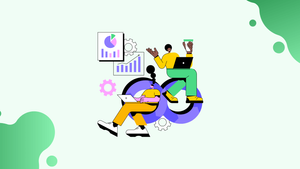Big Data and DevOps don’t relate much. Therefore it’s obvious for people working in DevOps domain to think that Big Data doesn’t have much to do with them – and vice versa. But the boundary line between the two fields is becoming obscure. Many businesses are accepting the need to implement DevOps in Big Data.
What is DevOps?
People dealing with Big Data or Data Science must have a very vague idea of the concepts of DevOps. Let’s discuss what exactly is DevOps.
DevOps is the advanced standard of software development and delivery. It improves the communication and collaboration between development and operation teams. Collaboration and communication are crucial for DevOps and QA (Quality Assurance). It is essential for effective communication of the Dev and Ops team.
DevOps involve agile development and it evolves collaboration between the software developers who build and test applications and the Operation teams that are responsible for deploying and maintaining IT systems and operations. DevOps can increase the speed of application delivery of an organization dramatically.
What is Big Data?
Big Data contains massive and complex data sets. Generally, the traditional data processing methods and software are inefficient to deal with them. Top Big Data challenges include data capturing, analysis, searching, sharing and visualization.
With the goal to increase the speed of data ingestion from a variety of data sources—mainframes, relational database management systems. It needs the right sets of tools and methodologies for the data ingestion and transformation that can be tested thoroughly to provide expected business results.
Need for DevOps in Big Data
Gaining an accurate and thorough understanding of Big Data project is very challenging. In most companies, due to lack of communication between Big Data developers and Operation teams, it becomes more difficult. Due to the lack of collaboration among the teams, it becomes quite difficult to deliver quality results. IT operations team is involved at the last moment which makes things more cumbersome and effects the whole productivity.
DevOps tools for Big Data result in the higher efficiency and productivity of Big Data processes. Same tools which are used in traditional DevOps are also utilized for DevOps implementation in Big Data eg. source code management, bug tracking, deployment tool, and continuous integration and deployment.
There are a lot of considerable contributions data analysts can make at different stages of software delivery pipeline. Here are a few of the benefits organizations can gain by combining Big Data and DevOps.
Effective software updates
Most of the software involves data at one point or another. A highly accurate understanding of the data source type while designing, updating or redesigning an app can be very helpful. It’s better to share this information with developers from the very beginning. Updates can be planned in advance if developers have a thorough discussion with data experts before writing the code. So, if you want an update in the software, it is necessary to have knowledge of the types of data sources your application is collaborating.
Lower error rates
Data handling errors are very common as the software is written and getting tested. The error rate of an app or software is directly proportional to the complexity of the application. Early detection of these error in the SDLC can save a lot of time and effort which can be utilized in a more important task. Data experts and other teams need to work together to make the development process much easier.
Consistency
It is very common when an application works on a development environment but creates a problem once it is ready to be deployed to the production. Therefore it is advisable to create a dev environment that is exactly the same as the real world environment. In the case of Big Data Applications, it is quite difficult but not impossible. The main reason for its difficulty is the diversity of data found in the real world. Also, the quality of the data is not consistent. By involving the data experts from the very beginning they can guide the developers about the challenges their software will face while deploying it to production.
Accurate feedback
After the successful release of the app on the production, data is collected. This data helps in understanding the strengths and weakness of the software and plan the updates accordingly. This process depends on the system administrator who can help in monitoring and maintaining the software while in production.
Both the Big Data teams and DevOps teams can benefit while working together. Collaborating with the data experts within your DevOps workflow can make the software delivery process easier. Even though Big Data and DevOps are traditionally seen as two completely different entities, the two departments should not be kept isolated from one another.
Conclusion
Through DevOps, software, and services can be delivered faster. Still, it is not considered as the key approach for Software Development by many of the worldwide organizations. Large scale companies are still following the old approaches because of the fear of transition failure.

